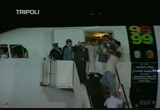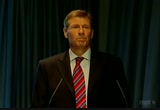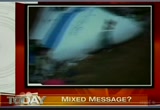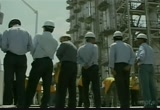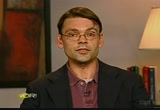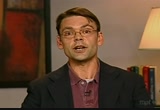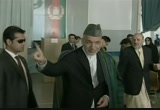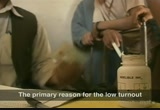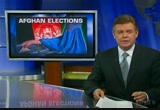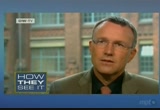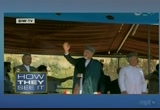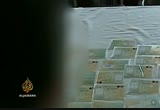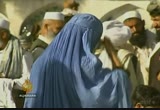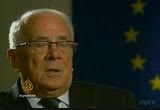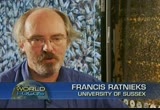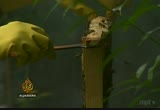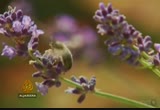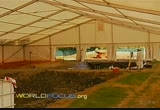tv Worldfocus PBS August 21, 2009 12:00am-12:30am EDT
12:00 am
bombing pan am flight 103 over lockerbie, scotland, is set free on compassionate grounds. was justice done? iran makes new concessions. it allows u.n. inspectors to visit a new nuclear reactor. what were those inspectors likely to have learned? amid scattered reports of violence, afghanis vote. tonight we focus on issues including widespread government corruption and taliban control. plus a look at the potential for voter fraud. and an enduring environmental mystery, disappring bees. now londoners are trying to do something about it.
12:01 am
good evening, i'm martin savidge. we begin tonight with a story that raises fundamental questions. what's compassionate, what's just, and how do you balance the two? we wondered about that today after seeing these pictures -- a libyan man convicted of murdering 270 people. the worst terror act in modern times, the bombing of pan am flight 103. the incident over lockerbie, scotland, shortly before 1988. because this is our lead discussion, we made it our lead focus r"ectonight. damon green of itn has our report. >> reporter: this used to be an aircraft, and for those who boarded as passengers, there was no way out. today the man convicted of
12:02 am
blowing a passenger jet into fragments and violently ending the lives of all 270 people on board, learned he will be free to live out his remaining days in peace. >> it is my decision that mr. abdel basset al megrahi, convicted in 2001 for the a jddq uq)minally ill with pros cancer be released on compassionate grounds and be allowed to return to libya to die. >> reporter: the destruction of pan am flight 103 remains one of the bloodiest terror attacks ever launched at the west and one which was immediately blamed on libya. at the time of the lockerbie bombing, the nation was a pariah state, internationally shunned, accused of sponsoring terrorism. its leader a figure of hate in the west. it was only after 15 years of sanctions that libya finally admitted it carried out the bombing and paid compensation to victims' families. and within a year, tony blair
12:03 am
was visiting tripoli to show that relations were back to normal, a controversial deal enabling prisoners to be transferred between the nations was also agreed, and at the same time trade deals were being struck the day after the two leaders met, the bp announced it was spending half a billion pounds to search for oil in libya. >> set to go free today. should a killer be released amidst in a global war on terror? this morning we'll talk to outraged family members of his victims. >> reporter: today's decision by scottish members has caused controversy, especially across the atlantic, where officials have said publicly has megrahi should die in a scottish cell, not at home with his family. the government in westminster always said it was for a scottish minister to died. >> this was a decision for him and him alone, and this decision, because it deals with scottish government. for that reason, it is up to him. >> reporter: many will say an act of compassion for a dying man is an accessible way to end this affair. others say it's a mercy he never
12:04 am
showed his to victims and never deserved himself. damon green, itn news. as you can imagine, the scottish decision is playing to decidedly mixed reviews. the announcement was carried in the capital of libya, that's tripoli, and it was hailed by some libyans. >> translator: this is great news for all libyan people and for all of the people around the world who care for justice. >> but a spokesman for the relatives of the bombing victims, bert ammerman, whose brother died in the plane bombing, ridiculed the decision. >> we've just released a man convicted of massacring 270 people. we've given state sponsor terrorism victory, and the families have to watch all of this. and 20 years later, this is the last sad chapter in this odyssey. >> did the scottish authorities make the right decision? tell us what you think about visiting our website. that's worldfocus.org. we would be interested to hear your opinions.
12:05 am
there is word tonight of a potentially important development in the standoff between iran and the international community over iran's nuclear program. diplomats in vienna tell the associated press that u.n. inspectors were allowed last week to visit iran's new nearly completed nuclear reactor. inspectors from the international atomic energy agency were also allowed to expand their monitoring at another iranian uranium enrichment site. for more on this, we're joined tonight from washington by charles ferguson, a senior fellow with the council on foreign relations and an expert on nuclear nonproliferation. thank you for being with us. >> thanks for having me on the show. >> how significant is this decision for iran to allow u.s. inspectors to visit its new nuclear reactor? and we should confirm which reactor are we talking about? >> it's a research reactor, but it can be used to make weapons-grade plutonium.
12:06 am
and that's why this is a high significance and it's very significant iran is allowing inspectors access because inspectors haven't had adequate access to the site for several months or up to a year. >> so what would the inspectors have learned in their time there? and i don't know how long they were given. >> don't know how long they were there either but i would imagine what they really want to learn is the design information of that reactor. are there places where they can put safeguards technologies so the inspectors have greater confidence iran is not going to misuse that react tore make weapons-great plutonium. >> so would they go in there with some sort of detection devices or are they just looking with their trained eye to spot pieces of equipment? >> well, at this stage because the reactor is not operating, it probably won't operate for another few years, they are not going to be taking environmental samples. they could do that. they could take what are swipes
12:07 am
and analyze for presence of plutonium. but i think at this stage what they want to do i think is mainly look visually, and also get blueprints and also if the iranians were cooperative, to work with them are there places they can put monitoring device, cameras, tags and seals, to have confidence iran is not misusing this. >> it's also been reported that the inspectors were granted greater uranium rights at the natanz site. what is the significant of that? >> that's very significant of that because the world's been very focused on what's going on at the natanz, at the uranium enrichment facility. that's where iran is getting the close toast making nuclear weapons materiel. if iran left a nonproliferation system, they could make weapons grade uranium in a matter of a few months. now, that would be maybe just one bomb's worth of material, so it's likely they will stay within a fawn proliferation regime for some period of time until they have a greater break-out capability. >> so all of this taken together, what does this tell
12:08 am
the world about iran's intentions when it comes to any nuclear weapons program? >> well, i think it's not a coincidence that at the same time iran is allowing inspectors access to the iraq reactor site, that the iaea allegedly is sitting on a report detailing the extent of its knowledge on iran's nuclear activities. the associated press reported almost at the same time this particular news story broke that the the current general is wonder willing to release this report or not or wait until his successor, who takes office in november to report. >> so a positive sign? >> i think so. i think it indicates that iran is still sensitive about their public imagine, despite the fact that ahmadinejad is still the president of iran. he's still very hardline and the supreme leader khamenei is still hardline. so i think that's something we might be able to use to our
12:09 am
advantage. >> charles ferguson, thank you so much for joining us tonight. >> you're welcome. turning to afghanistan, and today's much-anticipated presidential election. early this morning, president hamid karzai cast his ballot at a polling station in kabul. afterwards, he held up his instinct finger, a fraud prevention measure, towards the taliban. the taliban threatened to cut off the finger of anyone caught voting. the main opposition candidate, dr. abdullah abdullah, also cast his report amid election day violence. in kabul, gunmen exchanged fire among a group of two men with suicide bombers. and in helmand province, richt landed near a polling station. across the country, more than two dozen people were said to have been killed in election-day violence. all of this comes as a new poll of americans shows a slight majority, 51%, now say the war in afghanistan is not worth fighting.
12:10 am
anand gopal is a reporter for "the wall street journal" based kabul. >> reporter: the mood in kabul was very tense. there's been a lot of attacks in recent weeks and even today in kabul, there were a number of attacks across the city. and the streets are mostly deserted. there's a lot of police checkpoints. stores were closed. and, therefore, we saw low numbers going to the polls than we would see otherwise. the primary reason for the low turnout is because of the security situation. basically, half the country the government has very little controls, extremely violent, the taliban has a lot of sway. they targeted a number of polling places, for example, a province in neighboring kabul last night, they burned down polling centers. today they rocketed a bunch of polling centers. today in kabul they dispatched suicide bombers to attack the centers.
12:11 am
so people mostly wanted to avoid that and they wanted to stay away on election day. because low turnout is all in those areas which would normally support karzai, because they are all posthumes. if they don't turn out to vote, it may give a boost to his rivals. give enough of a boost but help narrow the gap and force a second round. >> of course, with so much attention focused on the elections in afghanistan, many international journalists are using the occasion to take a look at the conditions in that country. just what has america's ally, hamid karzai, accomplished during his five years in office? it's a matter of considerable interest in germany, which has 4,000 troops in afghanistan. is karzai doing a good job? not according to this story by germanese deutsche vella. it's a how they see it report. >> reporter: president hamid
12:12 am
karzai's power is still mainly limited to kabul. many afghans are unhappy with his style of government. he's been criticized for handing official positions to powerful ds. the organization transparency international says afghanistan is one of the most corrupt countries in the world. >> translator: the government in kabul is only interested in its own survival, as long as it remains rife with corruption and nepotism instead of concentrating on delivering good leadership, it will only be able to survive with military help eporter: efforts to rebuild the country have made some progress, but more slowly than many had hoped. afghanistan has received billions of euros in aid, including $550 million from including $550 million from but half of afghans still live below the poverty line. >> translator: given the choice between the west and its military potential or the taliban, who give people jobs
12:13 am
distributing weapons and pay them to carry out attacks on international troops, many people choose the taliban. they want security and a livelihood. >> reporter: the fact that women can stand for election now gives the impression that they enjoy more freedom, but the reality is very different. females are again being excluded from the education system. hamid karzai seems to have achieved little, but yet few doubt he will be re-elected. >> there are hundreds of international observers in afghanistan trying to ensure today's voting is free and fair. but even before it got under way, questions had been raised about whether there would be widespread fraud. it's an important question given how much the united states has riding on the outcome of the vote. for that reason, we wanted to share this investigative report by james bays of al jazeera english. it was filed earlier this week. >> reporter: these are in effect votes for sale. al jazeera was shown these voter
12:14 am
registration cards in the province of host in eastern afghanistan. these cards allow people into polling stations to vote. they have names but no photographs. the man selling him, who didn't want his face filmed, tell us there were 200 in total, the price about $200 u.s. per card. >> translator: there were no restrictions from the election commission for these cards. any man can go and ask for the cards, saying, i have a number of women in the house. you could get as many as you want. that's how i got 200 of the cards.?>@9wctp thousands of other people are doing the same thing. >> reporter: in the neighboring province, pachtar, this man who actually claims to work for afghanistan's independent election commission, showed us 150 cards. he says in total he has about a thousand.
12:15 am
>> translator: i've got these cards because i know there will be a lot of fraud. i know i will be able to sell them. it's a crime, but everyone is doing it. >> reporter: it is clear this is a nationwide problem. in just the last few days, al jazeera journalists have been offered cards for sale in six different provinces of afghanistan. there is a reason why this fraud is so easy, because of the conservative nature of afghan society, women don't have to have their photographs on their i.d. cards. we raised what we found with afghanistan's independent election commission. >> we found in one location 200 i.d. cards for sale. how concerned are you about this? >> i accept it that some of the people receive more than one batch. in some cases, the release of other batches to the lady without a picture. and that was another decision. because in some remote areas, the ladies are not able to take their photo.
12:16 am
they didn't let us. >> reporter: international monitors are concerned about possible irregularities. >> it will be a risk for fraud, for sure. and don't think it should have an influence on the final result. and that is the reason we are saying from the very beginning, in order to build the confidence with the afghan people, that we are in the position to denounce any attempt of massive fraud. >> reporter: but will election monitors be able to discover in fraudulent cards like these are being used? the deteriorating security situation means that they will almost certainly not be present at every polling station. james bays, al jazeera, kabul. and a followup to last night's lead story, those bombings in baghdad that killed nearly 100 people. today the iraqi government detained 11 security officers. they've accused them of negligence. prime minister nuri al maliki has also ordered a full security
12:17 am
review. it was the worst attack of its kind since american forces pulled out of iraqi cities nearly two months ago. we want to take a step back and now at an international environment and scientific ministry, which over time might have far more implications over any story we're reporting tonight. i'm talking about the disappearance of bees around the world. it's a development that raised great concerns because bees pollinate an estimated 90% of the crops that are our source of food. now some londoners are trying to do something about it. barbara sera of al jazeera english has their story. >> reporter: the ancient egyptians kept beehives 5,000 years ago and since then, bees have provided man with honey and wax as well as the crops they pollinate.
12:18 am
but something is troubling these efficient creatures. across europe and north america, bees have been disappearing at an alarming rate. in the uk last year, a third of all honeybees died. it's a worrying situation, and britain's first professor of beekeeping is trying to find the solution to the plight of bees. >> that's what it's all about. >> the two main things threatening bees are diseases and lost of forest, so we're focused on those particular things. we're trying to breed disease-resistant honeybees. we are looking at the control of specific pests of honeybees and we're also determining where the honeybees of foraging. man is certainly responsible for some of the problems honeybees are facing. we're farming now so intensively that vast parts of the country are full of plants but not any plants that are y good to bees or insects because there are not flowers. >> reporter: their numbers may
12:19 am
be dwindling across the country but there is one perhaps surprising place where bees are thriving, and that's london. colonies like this one have been springing up across the city's rooftops. these beehives are on top of the department's store in the mason in piccadilly. and the honey made by its bees is then sold in the shop. for more and more londoners, the declining numbers are deciding to keep bees. allison and brian started four years ago. their hive is in the garden continue can host up to 50,000 bees and they all seem to be doing well. >> there's more variety for the bees to eat in the city. so you have the parks, you have the railway sidings, you have people's gardens, you have the trees along the road. where in the countryside you might just have fields of oil seed rape or other crops, and they say that honey in the city justastes much, much nicer than honey from the countryside.
12:20 am
>> reporter: it's easy to forget that bees don't just make honey. they're responsible for pollinating more than 90% of the crop that's we rely on for food, from apples and pears to broccoli and tomatoes. albert einstein reportedly said if these were to die out, humanity would follow in four years. the honeybee isn't dying out just yet, but it may be trying to tell us something about our impact on the environment. barbara sera, al jazeera, london. >> for more about the very worrisome decline in the bee population, we are joined once again tonight by michael novacek. he is the provost of science at the american museum of natural history. welcome back. >> nice to be here, martin. >> we've heard about this problem actually for a number of years now, the shrinking bee population around the world. do we know how much the bee population has actually declined? >> we have a good sense in europe, for example, the striking statistics in america b that we're getting heavy colony loss.
12:21 am
i think the estimate in the film was 30% in europe. so this is very serious. >> but why? have we figured out exactly what's causing it? >> the matter of cause. as this film says, some of the suspects are infectious disease or the lack of plants, diversity of plants that provide food for bees. but it's really there's more of a mystery to this. what we're talking about is a collapse of colonies that are just due to the loss of adults, the disappearance of adult bees, worker bees. and why? well, a number of suspects. infectious disease, maybe a virus. maybe the bees don't have the immune system that allows them to resist that. there's even some thought that the genetic -- the genome is so narrow in these bee populations because they interbreed that their not adaptive, they're not flexible for these invasions of infectious disease. >> there was that quote in the story that said, you know, if the bees had died off -- this is albert einstein, humans would
12:22 am
follow within four years. is that serious? is that really -- >> well, he -- it's a poetic way of putting a very serious problem. because think of it this way, you know, bees are the champions of the insect pollinators. pollination is what drives the modern ecosystem, and it's really what the basis is for the crops and the food that we depend on. and if you -- bees alone, honeybees alone, account for about $16 billion a year in america in terms of crop production. so you could have -- if this were permanent, if these things were sustained and permanent, then you could have very catastrophic ecosystem, agriculture and economic results. >> are there things we should be doing, humans, i mean, to try to somehow help the population? >> the film talks about urban -- the development of urban beekeeping, and that's a nice trend because it takes advantage of all of the -- ironically, all of the plant diversity that you have in cities.
12:23 am
and it also teaches people a little more about the importance of bees. but this isn't going to do the trick. what we have to do is scientific attack the problem in these agriculture systems outside of cities. studies in genomics, studies in these diseases, studies of the adaptability of bees to these changes are key here. >> michael novacek, as we like to say, you are the bee sneeze. thank you very much for joining us. >> nice to be here again. we want to close tonight with another story which, like our first from lockerbie, scotland, makes us think about the value of human life and about our own connection to history. it's about the extraordinary efforts going on in eastern france to unearth and identify the remains of hundreds of australian soldiers killed more than 90 years ago during world war i. stephanie kennedy of abc australia has this report. >> reporter: for three months, a
12:24 am
team of archaeologists and anthropologists have undertaken painstaking work. deep down in this cleland, they brush add way the soil and unearthed the remains of schools of soldiers from world war i. >> we found, as far as i understand it, 222 solders' remains have been recovered from sites, and about 130 of those have been completely in the mortuary with all of the artifacts associated with them. >> after the top section of soil was removed, archaeologists used small tools to uncover the burns. the bodies were buried by their a return ticket to free mantel brings bones, crucifixes, rings and belt buckles. they're all crucial clues in a jigsaw puzzle identifying the
12:25 am
soldiers. >> it's the traces of dna found in teeth and bone fragments that hold the key to giving these lost solders back their names. the next stage involves matching that dna to samples from living relatives. >> they're very challenging samples but there is sufficient dna from a good number of these samples for us to move on and take samples from all of the remains. >> reporter: so you're optimistic there will be matches? >> oh, yeah, very optimistic. >> reporter: this is ambitious project has tract someday criticism. there are concerns that the remains may have been compromised. >> the project is not in crisis and never has been in crisis. the project is on track to achieve what it is we expect it to do. >> reporter: across the road, a new commonwealth cemetery is under construction. it is here this army lost a history for over nine decades will finally be laid to rest. stephanie kennedy, abc news, furmel. and that is "worldfocus" on a busy thursday night. as always, we encourage you to visit our website worldfocus.org and drop us a line. i'm martin savidge.
12:26 am
379 Views
IN COLLECTIONS
WMPT (PBS) Television Archive
Television Archive  Television Archive News Search Service
Television Archive News Search Service 
Uploaded by TV Archive on

 Live Music Archive
Live Music Archive Librivox Free Audio
Librivox Free Audio Metropolitan Museum
Metropolitan Museum Cleveland Museum of Art
Cleveland Museum of Art Internet Arcade
Internet Arcade Console Living Room
Console Living Room Books to Borrow
Books to Borrow Open Library
Open Library TV News
TV News Understanding 9/11
Understanding 9/11
